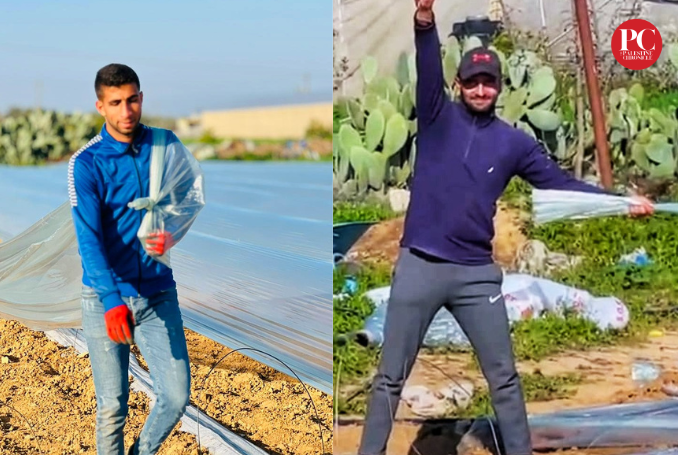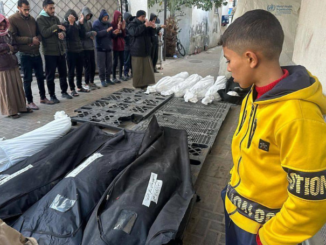
By Rania Taima
The impact of Israeli aggression against farmers goes beyond the damage done to land and crops. During the 2014 Israeli attack on the Gaza Strip, as well as destroying Abu Bakr’s crop, Israel destroyed the family vehicle used to transport the crop.
Palestinian farmers in Gaza face constant challenges, due to the Israeli military occupation and protracted siege.
From the eviction of Palestinian farmers from their land to the use of toxic fertilizers, farmers in the besieged enclave confront this ongoing hardship on a regular basis.
In some parts of the world, living in the countryside is often associated with an idyllic existence. But the experiences of two Palestinian farmers, Bilal and Abu Bakr tell a very different story.
At the crack of dawn, Bilal Musabih goes to his father’s land of four dunums – an acre – which is located along the southern fence separating Gaza from Israel.
Bilal is 25, is an electronics engineer, who graduated with high grades but remains unemployed. His fate is that of thousands of graduates struggling with unemployment because of the hermetic Israeli blockade on Gaza, which has crippled its economy.
“My graduation certificate is useless,” Bilal lamented as he trimmed leaves from the family field while bending down on his knees.
He has been working with his father since 2007 as he was unable to find another job for all of those years. He is one of the many farmers in Gaza who have witnessed the severe impact of Israel’s offensive on the agricultural sector in the Strip.
Bilal is the only source of income for his family. Thus, he must maintain his job, a hard labor, made harder, not only by the Israeli siege but also by his own declining health – due to damage to peripheral nerves and an atrial septal defect.
‘Move or Die’
As a way to supplement his income, Bilal also rents land to grow tomatoes, green peppers, peas, and melons.
Productivity varies from season to season depending on the situation at the borders in the Khuza’a area. During the growing season, the continuous Israeli attacks on the field, the bulldozing of land, and the destruction of crops dramatically affect crop yields.
“Israeli bulldozers recently decimated almost 50 meters of the field where I work,” Bilal told The Palestine Chronicle, “and we have been working together with the farmers to replant it at a loss.”
Similarly, three years ago, Israel destroyed Bilal’s harvest before his own eyes.
Along with other farmers, he had rented a 10-dunum plot (2.5 acres) and sowed it with melons. On that very same day, three Israeli bulldozers and a tank destroyed the field.
“The farmers and I formed a (human) shield in front of the bulldozers, but they responded with gas bombs,” he said.
“Move or we will kill you,” the soldiers warned them using loudspeakers. “It wasn’t an idle threat, and I felt that any breath could be my last,” Bilal added.
The farmers were forced to withdraw after shots were fired close to their bodies. The bulldozer destroyed the crop, compelling them to replant everything, again, at a loss.
“It was a month of financial debt and despair,” Bilal said.
Planes and Tomatoes
In addition to bulldozed land and crop destruction, Palestinian farmers are regularly refused access to their own land. It happens regularly at the onset of every military aggression.
Israeli forces use close-range air surveillance warplanes to monitor the area and fire at any farmer approaching his land. This is in addition to the random shooting into farming properties, which occurs on a routine basis, frequently resulting in civilian casualties.
Bilal tells us of a municipal worker who was shot in the foot while connecting water pipes to irrigate close to the border. “The wounded man’s injury resulted in permanent paralysis of the foot.”
During the 11-day Israeli assault on the coastal enclave in May 2021, Bilal’s hardship worsened. He needed to water the tomatoes, but how?
Deprived of access to his tomato crop for three days as a consequence of Israeli bombardment, he risked his life to water the crop for ten minutes in an attempt to prevent it from wilting, though it needed much more than this.
“The presence of Israeli warplanes prevents us from attempting tasks lasting more than ten minutes, since any movement towards the land is likely to be fatal,” Bilal said.
But the real losses began soon after the ceasefire. Bilal realized that all the tomatoes were overripe, and local merchants refused to purchase the crop. “Fearing further loss, I eventually sold it for a third of the market price,” Bilal added with a dejected voice.
Carrots and Nightmares
Like Bilal, Abu Bakr Qudaih, 24, had hoped to work with his engineering degree. The dream didn’t actualize, and he, too, turned to the land.
And like Bilal, Abu Bakr was also denied access to his land during the 11-day war on the enclave in 2021. He and his partners were prevented from irrigating, fertilizing, and harvesting their carrot crops.
“The carrots dried out,” Bakr recounted. “I expected a yield of 25 tons but only salvaged five. The remaining withered ones were fed to our goats.”
To make matters worse, once the ceasefire had been declared, Israel began exporting cheap carrots into the Strip, thus destroying Gaza’s small farms.
“I had to sell a box of carrots for less than two shekels instead of 25,” the young farmer complained.
This way, thousands of shekels have been lost.
“Earnings from the carrots were insufficient to even cover the expenses of the vehicle fuel incurred transporting them for sale,” Bakr told the Palestine Chronicle. “Carrots will remain a nightmare in my life,” Bakr said despondently.
Poisoning the Crops
The long-term effects of Israel’s poisonous ‘fertilizers’ have been significant for Gaza’s agriculture. Bakr, who has always been involved in farming, recalls witnessing Israel damaging his crops and those of his neighbors.
“A sprinkler agricultural aircraft flies overhead spraying poisonous fertilizer over the crop,” he said. Bakr’s 2018 wheat crop was destroyed in this way, resulting in losses of thousands of shekels per dunum.
Though farmers rarely succeed in counteracting the poison to preserve their crops, alternative solutions such as water sprays and humidifiers can sometimes mitigate its effects.
“As long as we spray before the crop gets poisoned, it will survive. Otherwise, the harvest will be lost, and this is our fate,” Bakr said.
The damage extends beyond the crop. Harmful fertilizers destroy soil structure, making it barren without applying alternative composts such as agricultural gas.
“The expenses for soil are at least 1,000 shekels – approx. $250 – without any form of compensation from the authorities,” he said.
In contrast, soil free of this Israeli fertilizer produces a more productive harvest. “During one of the growing seasons free of harmful fertilizers, peas and melons yielded a bumper harvest estimated at 16,000 shekels ($4200),” Bakr said with obvious pleasure at the memory.
However, it was just a memory.
Dead Rabbits and Hope
The impact of Israeli aggression against farmers goes beyond the damage done to land and crops. During the 2014 Israeli attack on the Gaza Strip, as well as destroying Abu Bakr’s crop, Israel destroyed the family vehicle used to transport the crop.
“As of now, we are still responsible for $400 of the $3000 price of the vehicle. We also lost my father’s grocery store, which used to sell crops grown on our farmland,” he said.
Worse; Bakr’s organic fertilizer program uses manure as fertilizer because it is cheaper. However, Israel restricted access to Bakr’s farm during the 2014 aggression, resulting in many animals dying from lack of food and care. This meant that Bakr was compelled to discontinue utilizing this method of organic fertilizer.
“Our investments in farm animals-rabbits, chickens, goats, ducks, and pigeons have cost us over 8,000 shekels ($2000) in losses,” he said.
Despite the significant challenges threatening both Bilal and Bakr’s livelihoods, they are determined to continue farming.
“We have only one investment, which is our land,” Bakr explained, “and we invest it with our lives.”

– Rania Taima is a Palestinian translator and graduate of Al Azhar University, Department of English Language and Translation. WANN contributed this story to The Palestine Chronicle.







